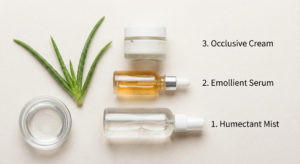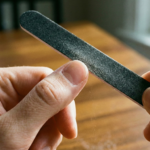The Best Way to Hydrate
Do you want to hydrate your skin effectively? Experts say you need more than just water. The best method is simple. First, apply a humectant (like Hyaluronic Acid) to damp skin. This pulls water in. Next, use a thick moisturizer immediately. This locks the water inside. This two-step process stops water loss and makes your skin glow.
Know Your Skin: Dehydrated vs. Dry
First, you must know what your skin needs. Treating the wrong problem can cause breakouts.
-
Dehydrated Skin (Needs Water):
This is a temporary condition. It can happen to anyone. Even oily skin can be dehydrated. Does your skin feel tight? Does it look dull? If yes, your skin is thirsty.
-
Dry Skin (Needs Oil):
This is a skin type. It means your skin produces less oil. Does your skin feel rough or flaky all over? If yes, you need oil-based creams.
The Science: The “Moisture Sandwich”

Deep Dive: The Size Matters Not all humectants are the same. For example, Hyaluronic Acid comes in different sizes. High molecular weight sits on top to smooth the skin. Low molecular weight goes deep to hydrate from within. Look for a serum that claims “multi-molecular” hydration for the best results.
1. Humectants (The Magnets)
These ingredients grab water from the air.
- Best for: Pulling moisture in.
- Look for: Hyaluronic Acid, Glycerin, and Aloe Vera.
- Tip: Always use these on wet skin.
2. Emollients (The Smoothers)
These fill in tiny cracks in your skin. They make your face feel soft instantly.
- Best for: Smoothing rough texture.
- Look for: Ceramides and Squalane.
3. Occlusives (The Seals)
Think of this as a lid. It stops water from evaporating into the air.
- Best for: Locking in hydration.
- Look for: Shea Butter, Vaseline, or Dimethicone.
Your Daily Routine for Glowing Skin
Consistency is the secret. If you wonder how to hydrate your skin effectively, follow these exact steps morning and night.

Morning: Protect & Hydrate
- Cleanse Gently: Use a creamy face wash. Avoid harsh foams.
- Mist Your Face: Leave your skin damp. Do not dry it completely.
- Apply Serum: Use a Hyaluronic Acid serum now.
- Seal It: Apply a light moisturizer.
- Protect: Finish with SPF 30+. Sun damages your moisture barrier.
Evening: Repair & Restore
The Double Cleanse Method: Sunscreen and makeup are oil-based. Water alone cannot remove them properly. First, use an oil-based balm or micellar water to melt away the debris. Follow up with your water-based cleanser to clean the actual skin. This ensures your pores are clean and ready to absorb hydration.
- Wash Well: Remove all dirt and makeup.
- Treat: Use a serum with Niacinamide. It strengthens your skin.
- Moisturize Heavily: Use a thick cream with Ceramides.
- Optional Trick: Apply a tiny bit of Vaseline last. This is called “Slugging.” It works wonders for dry skin.
Ingredients to Avoid
Some products ruin your hard work. Avoid these when learning how to hydrate your skin safely:
- Alcohol: It dries out your skin fast.
- Physical Scrubs: Harsh scrubs create tiny tears. This lets moisture escape.
- Strong Fragrance: This often irritates thirsty skin.
Lifestyle Tips: Hydrate from Within
Creams are important. But your habits matter too.
- Check Water Heat: Hot water melts your natural oils. Use lukewarm water instead.
- Use a Humidifier: AC and heaters dry out the air. A humidifier puts water back in.
- Eat Water: Eat foods like cucumber and watermelon. They hydrate you slowly and effectively.
- Switch to Silk Pillowcases: Did you know cotton pillowcases absorb moisture from your face? This leaves your skin dehydrated by morning. Switching to a silk or satin pillowcase helps. It creates less friction and keeps your skincare products on your face, not on your pillow.
What Do Doctors Say? (Medical Facts)
We checked top medical sources to ensure safety.
- American Academy of Dermatology (AAD): They have a strict rule. You must moisturize within three minutes of washing. This traps water before it dries.
- Mayo Clinic: Doctors here say lifestyle matters. Shorter showers help keep skin hydrated. They also suggest using a humidifier in winter.
- Skin Barrier Research: Studies show that a broken barrier causes water loss. Ingredients like Ceramides are essential to fix this wall.
FAQs: Common Questions
| Question | Answer |
| Can I sleep with moisturizer on? | Yes. Sleeping with moisturizer helps lock in hydration and repair your skin overnight. |
| What are common Korean skincare mistakes? | Over-layering products, using harsh exfoliants too often, and skipping sunscreen. |
| What is the 4-2-4 rule in skincare? | A cleansing method: 4 minutes oil cleanse, 2 minutes foam cleanse, 4 minutes rinse. |
| How to get 100% clear skin? | There’s no instant guarantee—consistent routine, gentle products, healthy habits, and patience help most. |
| What is 7-step Korean skincare? | Cleanser, toner, essence, serum, sheet mask, eye cream, moisturizer. |
| How to hydrate your skin? | Use a hydrating cleanser, apply moisturizer on damp skin, and drink enough water. |
Can I use Hyaluronic Acid every day?
Yes, absolutely. Since it is naturally found in your body, it is safe for daily use. In fact, using it twice a day is recommended for continuous hydration. Just remember the golden rule: never apply it to dry skin!
Final Thoughts
Hydrated skin is healthy skin. The secret is simple. Know your skin type. Use the right ingredients. And always apply products to damp skin. Start this routine today for a radiant glow.









3 thoughts on “How to Hydrate Your Skin: Simple Expert Steps for a Glow”